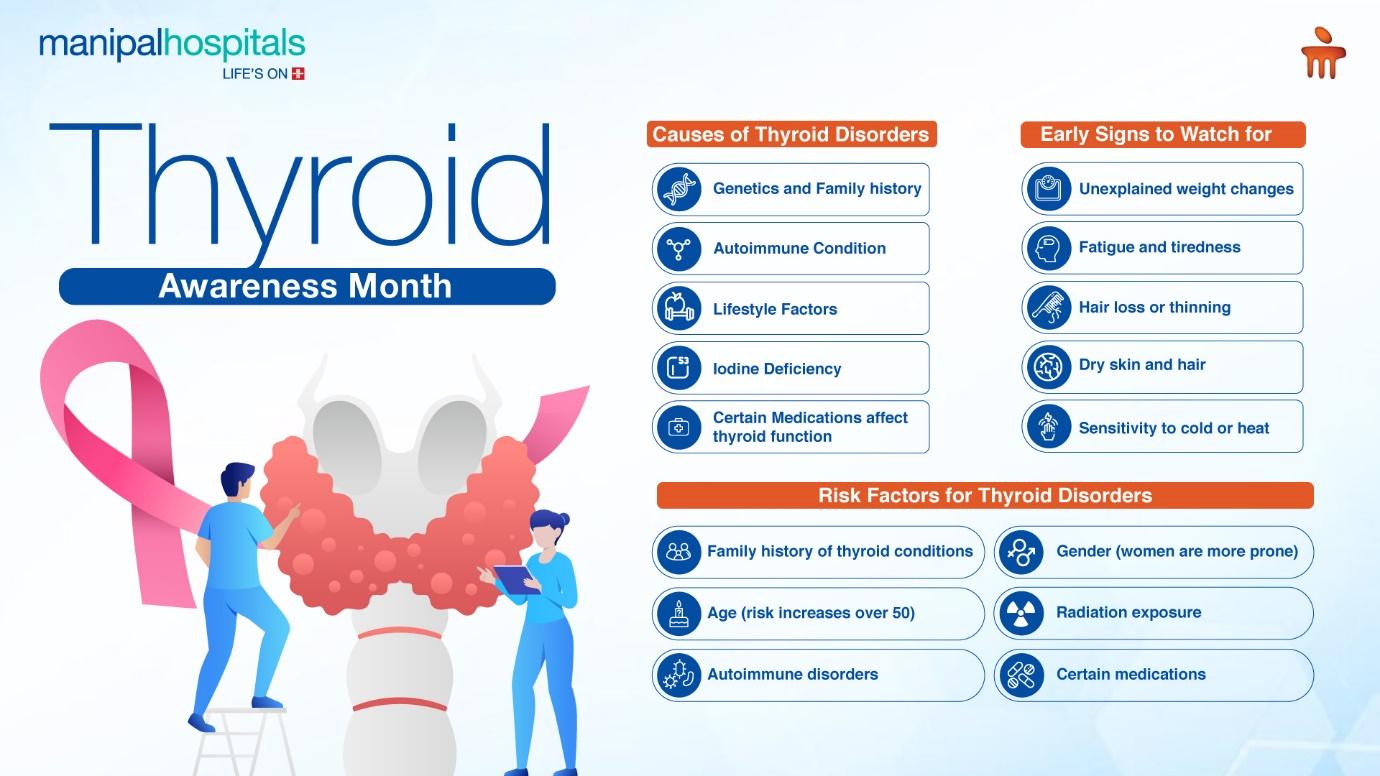
January marks Thyroid Health Awareness Month, a time to shine a spotlight on this often-overlooked but crucial gland. Nestled in the neck, the butterfly-shaped thyroid plays a vital role in regulating our metabolism, influencing everything from energy levels and mood to heart rate and body temperature. This month-long initiative is more than just a calendar event; it's a call to action to understand our thyroid health, its impact on our well-being, and the potential risks we face.
Synopsis
Understanding the Thyroid: Your Body's Metabolic Mastermind
Despite its small size, the thyroid gland is a powerhouse of hormone production, significantly influencing our overall health. Here's a glimpse into its key functions:
- Regulating Metabolism: The thyroid hormones act as the body's thermostat, controlling how quickly we burn calories and generate energy.
- Promoting Growth and Development: These hormones play a significant role in growth and development, especially during childhood and adolescence.
- Influencing Brain Function: Thyroid hormones also impact brain development, cognitive function, and mood regulation.
When Things Go Awry: Recognizing Thyroid Disorders
Thyroid disorders arise when the gland produces too much or too little thyroid hormone. Common types include:
- Hypothyroidism: An underactive thyroid, leading to symptoms like fatigue, weight gain, dry skin, and depression.
- Hyperthyroidism: An overactive thyroid, causing symptoms like anxiety, weight loss, rapid heartbeat, and tremors.
- Autoimmune Conditions: Hashimoto's thyroiditis and Graves' disease are autoimmune disorders that attack the thyroid gland.
Unveiling the Causes of Thyroid Disorders:
Understanding the causes of thyroid disorders is crucial for prevention and management. Several factors play pivotal roles in contributing to thyroid dysfunction:
- Genetics: Family history influences thyroid predisposition.
- Autoimmune Conditions: Diseases like Hashimoto's and Graves' trigger the immune system against the thyroid.
- Iodine Deficiency: Inadequate iodine disrupts hormone production.
- Certain Medications: Some drugs affect thyroid function.
- Lifestyle Factors: Stress, diet, and environment also impact thyroid health.
Early Signs of Thyroid Disorder to Watch for:
Recognising the early signs of thyroid disorders empowers individuals to seek timely medical attention. Being aware of these indicators can facilitate early detection and treatment, some of the common symptoms include:

Physical Symptoms:
- Unexplained weight changes (significant gain or loss)
- Fatigue and tiredness
- Hair loss or thinning
- Dry skin and hair
- Sensitivity to cold or heat
- Muscle weakness
- Constipation
- Swelling in the neck
Psychological Symptoms:
- Mood swings and irritability
- Anxiety and depression
Risk Factors for Thyroid Disorders:
Certain risk factors increase the chances of developing the condition, these include:
- Family history of thyroid conditions
- Gender (women are more prone)
- Age (risk increases over 50)
- Iodine deficiency
- Autoimmune disorders
- Certain medications
- Radiation exposure
Taking Charge of Your Thyroid Health:
Treatment Options:
- Medication: Thyroid hormone replacement therapy (for hypothyroidism) and anti-thyroid drugs (for hyperthyroidism) are common treatments.
- Surgery: In some cases, surgical removal of part or all of the thyroid gland may be necessary.
- Lifestyle Modifications: A healthy diet, regular exercise, stress management, and avoiding smoking can support thyroid health.
- Regular Monitoring: Routine check-ups and blood tests to monitor thyroid hormone levels are crucial for early detection and management of thyroid disorders.
- Join the Conversation: Start a Dialogue on Thyroid Health
Thyroid Health Awareness Month as well as World Thyroid day is an opportunity to start conversations about thyroid health, break down stigmas, and encourage proactive care. Share your experiences, raise awareness, and support those living with thyroid disorders. Together, we can make a difference in the lives of millions affected by thyroid dysfunction.
Knowledge is power. By understanding your thyroid health, you can take control of your well-being and thrive.
FAQ's
The healthcare professionals typically perform physical examinations and order a blood test to measure your thyroid hormone levels. There are some additional tests like ultrasound or radioactive iodine uptake may be needed in some cases.
While you can't completely prevent all thyroid problems, maintaining a healthy diet, managing stress, and avoiding smoking can help support your thyroid health.
Yes, having a family history of thyroid disorders increases your risk. It's important to get regular check-ups and talk to your doctor about your risk factors.
Yes, untreated thyroid problems can increase the risk of miscarriage, preterm birth, and complications for the baby. If you're pregnant or planning to become pregnant, it's important to get tested for thyroid problems.
Yes, absolutely! With proper diagnosis and treatment, most people with thyroid disorders can live normal, healthy lives.





















 3 Min Read
3 Min Read




.png)












